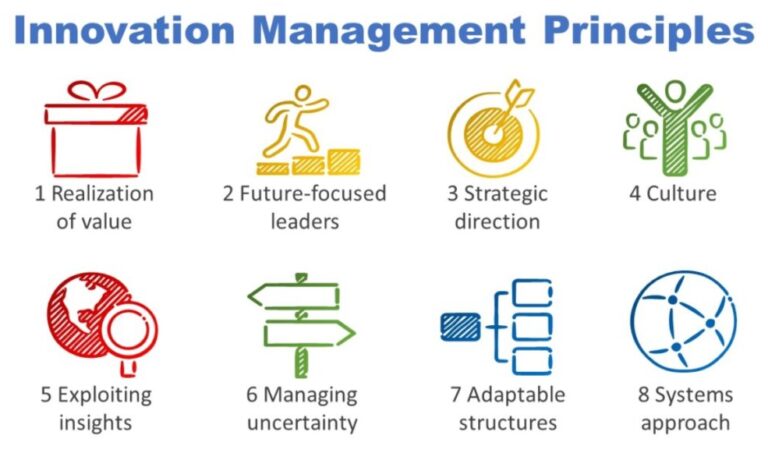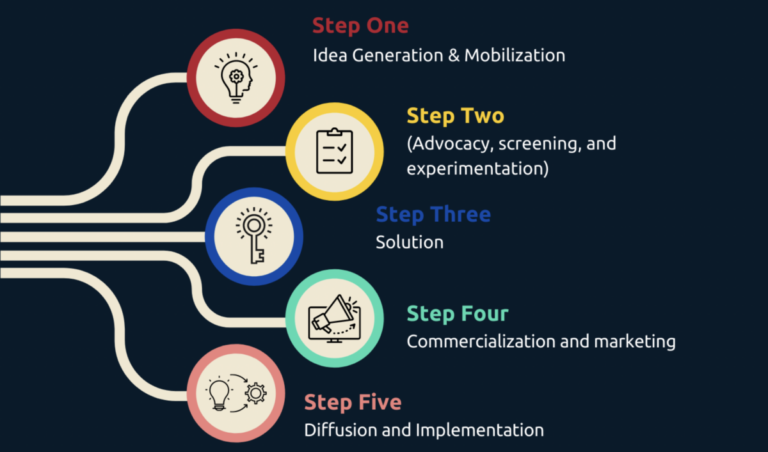Innovation management is a system for managing innovative relationships and processes. It is based on the constant search for new ideas, organization of processes, promotion and implementation of innovations.
The essence of innovation management
This is one of the varieties of general management, in which the entire emphasis is on innovative technical development. We can say that this is a kind of body of knowledge and systems on modern management about methods for developing effective innovations in the future.
Innovation management is mechanisms of economic influence aimed at the creation, promotion and implementation of innovations, as well as on business relations between producers, buyers and others. This impact occurs due to some special management techniques and strategies. In tandem, all these strategies and techniques constitute a control mechanism. This is innovation management.
Stages of development of innovation management
It is customary to distinguish four main stages in the development of innovation management:
- Factor approach. Involves studying the sphere of innovation as one of the key areas of the country’s development;
- Situational approach.The manager acts depending on the current market situation;
- Systems approach. Assumes an understanding of the organization as a complex system consisting of interrelated elements;
- Functional system. It is a set of methods for making management decisions.
Main features of innovation management
Innovation management can be distinguished by the following list of criteria:
- In innovation management one has to deal with a unique type of resources: scientific, technical achievements (technology, information, scientific achievements, etc.), as well as intellectual ones. It is important to understand the fundamental differences between inventors and managers. The first one is not an entrepreneur. For an inventor, the first place is his achievement, discovery or invention. For a manager, his organization always comes first.
- Innovation management is systematic, since the implementation of various disciplines requires structure and the solution of many tasks and problems.
- Innovation management must be as creative as possible and consider the entire problem as a whole. His main task is to ask the right questions and create the best techniques that will lead to solving the problem.
- All structures of such management should be as flexible as possible.
- Such a manager must be a specialist capable of performing non-standard tasks, since he works in a rather unusual environment. This is especially true in fast-growing markets.

The subjects of management can be either a group of qualified specialists (marketers, financiers, etc.) or an individual manager capable of taking on such responsibility. The main task is to use methods and methods of management influence to carry out such management of the object that will certainly lead to the fulfillment of the assigned task.
By objects of management we mean innovations directly (the latest techniques, for example chat bots, products, etc.), new processes, as well as all relationships between private participants in the innovation market (sellers, intermediaries, buyers).
And finally, the third element related to this type of management is information or the corresponding product.
Functions of innovation management
Innovation management is responsible for some functions that determine the creation of a management structure. It is customary to distinguish two main types of innovation management
- Functions of a managerial subject;
- Functions of a management object.
Functions of a managerial subject
The main functions of the subject include:
- Forecasting. Capable of covering a long-term process in the future, taking into account economic and technological management, both in general and in particular;
- Planning. Based on activities to create planned goals and objectives of innovation and measures for their practical implementation;
- Organization. It is based on bringing people together and jointly implementing an innovative program based on certain rules;
- Regulation. It is based on the impact on the management object in order to achieve a state of stability in the economic and technological system in situations where they deviate from the general program;
- Coordination. This is the coordination of the activities of each link, department and specialist;
- Stimulation. It is the interest of employees as a result of their work;
- Control. Checking the creation of the plan and its further implementation.
The risky financial investment function represents an investment in venture capital financing of investments in the market. Investing in a new product or service, especially if it has not yet been on the market, is always a big risk. For this reason, investment almost always occurs through special venture funds.
Forecasting in innovation management
A forecast is usually understood as informed judgments about the probable states of an object in the future, about various development paths and timing. If we talk specifically about the management system, then this is the pre-planned development of models for the development of a management object. All criteria, such as scope of work, deadlines, characteristics, etc., are only probable and allow for adjustments.

The main purpose of forecasting is to obtain variations in the development of quality criteria, costs and other elements using strategic plans and research, as well as the development of the entire management system. The main forecasting tasks include:
- selection of a forecasting method;
- market demand forecast;
- identification of main trends;
- detection of indicators influencing the magnitude of the beneficial effect;
- forecast of the quality of the final product;
- justification of the feasibility of the project.
If we consider the octane management principles that can be applied in innovation management, these will be:
- correct distribution of labor resources;
- power;
- iron discipline;
- unity of command;
- unity of leaders;
- everyone should forget about their own, personal interests for the sake of the general ones;
- decent reward;
- centralization;
- strict hierarchy;
- strict order;
- lack of staff turnover;
- justice;
- welcome any initiative;
- community and unity of employees.
All these principles were relevant before and do not lose their relevance at the moment.








